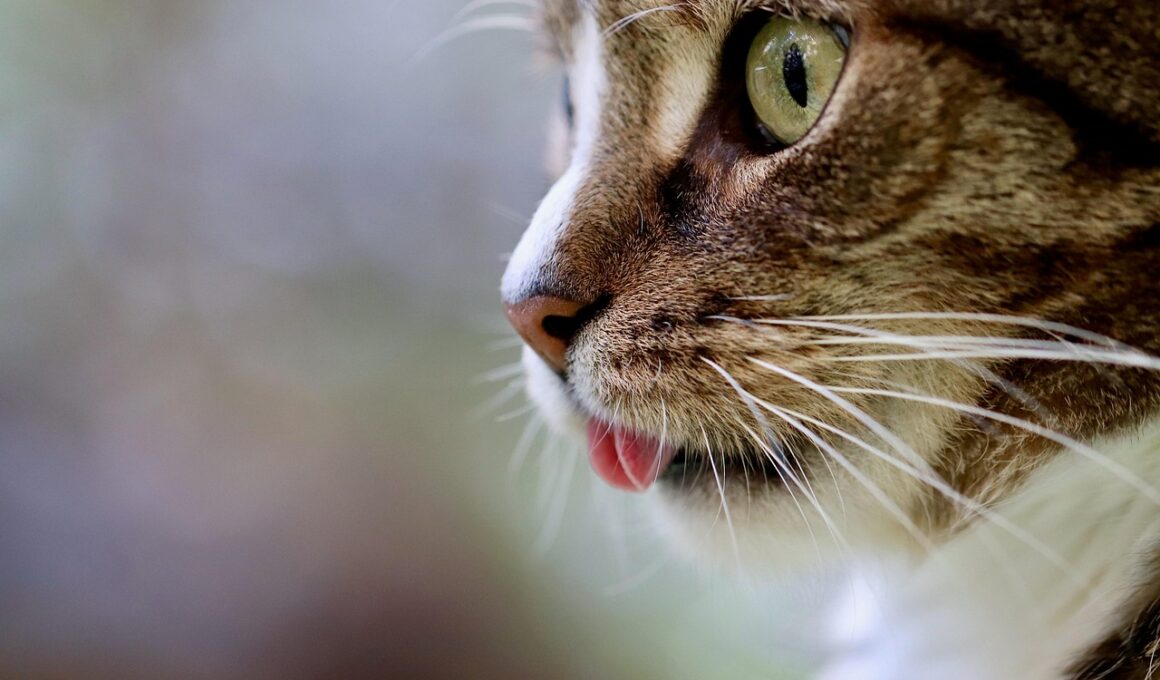How to Create a Senior Cat Kidney Health Care Plan
Creating a thorough kidney health care plan for your senior cat is essential for maintaining their quality of life. Older cats often face health challenges, including kidney issues, which can significantly affect their well-being. One key component of this plan is regular veterinary check-ups, where kidney function can be assessed, and early signs of problems identified. Ensure that your vet monitors your cat’s blood work regularly, as this can reveal critical details about kidney performance. Another essential aspect is diet. Senior cats need specially formulated diets that support kidney health; these typically have lower protein and phosphorus levels. Consider consulting with your vet about the best food options available. Additionally, maintaining adequate hydration is fundamental. Ensuring that your cat drinks enough water will help their kidneys function optimally. You might consider introducing water fountains, as many cats prefer fresh, flowing water. Also, be attentive to any behavioral changes in your senior cat, such as increased thirst or altered urination patterns, as these can indicate potential kidney issues. Adjusting care promptly can make a significant difference in their health outcomes long term.
In addition to diet, promoting a comfortable and stress-free environment can greatly benefit kidney health in senior cats. Stress can have detrimental effects on a cat’s overall health and may exacerbate kidney problems. Make sure your cat has a designated quiet space where they feel safe and can retreat when necessary. This area should have their favorite bed, toys, and blankets to encourage relaxation. Engage in gentle play and enrichment activities, such as puzzle toys or interactive games, without overwhelming your cat. Environmental enrichment promotes mental health, and maintaining a routine can make daily living more predictable for your cat. It also helps to monitor their weight regularly, as obesity can complicate kidney issues. Keeping track of their weight can help identify changes, prompting timely consultation with your veterinarian. Ensure that treats are healthy and low in calories to reduce excessive weight gain. Finally, consider supplements recommended by your veterinarian that support kidney function, which can help maintain your senior cat’s health. As their kidneys age, proper management through diet, exercise, and environmental factors plays a vital role in enhancing overall kidney health.
Hydration Strategies for Senior Cats
Hydration is crucial for senior cats, as they are at higher risk for dehydration, which can worsen kidney conditions. It is important for cat owners to be proactive in encouraging their pets to drink more water. One effective strategy is to provide access to multiple fresh water sources around the house, making it more convenient for your cat to drink. Additionally, consider varying the water’s temperature, as some cats may prefer cooler or warm water. Offering wet food is another excellent way to boost hydration since these diets can have a higher moisture content. Moreover, consult your veterinarian about specific wet food options that cater to kidney health. If your cat seems hesitant to drink, try adding flavorings like low-sodium chicken or fish broth to their water or food. You can also invest in cat water fountains, which can attract picky drinkers due to the moving water, making it more appealing. Monitor your cat’s drinking habits, noting any changes or decrease in water intake, as this can indicate potential health concerns. Keeping your cat hydrated is paramount for all aspects of their health, particularly their kidneys.
Regular blood work and urine testing are vital components of monitoring kidney health in senior cats. These tests provide insight into how well the kidneys are functioning and can help detect any potential issues before they become severe. Your veterinarian can recommend an appropriate testing schedule based on your cat’s age and overall health. Typically, senior cats should have blood tests every six months or as frequently as advised by your vet. Early detection of kidney disease can make a significant difference in treatment options and outcomes. Changes in phosphorous and creatinine levels can indicate the progression of kidney issues and help tailor your cat’s care plan accordingly. Along with blood tests, urinalysis provides additional important information about kidney function. It can help determine the concentration of urine, revealing how well the kidneys are filtering waste. If abnormalities are detected, your veterinarian may suggest further diagnostic imaging, like ultrasounds. Be sure to communicate any concerns or noticed changes in behavior with your vet. Regular check-ups can empower you to make informed decisions and advocate for your senior cat’s kidney health.
Recognizing Symptoms of Kidney Problems
As a cat owner, understanding the symptoms of kidney issues in senior cats can help in timely intervention. Common signs of kidney problems may include increased thirst, frequent urination, weight loss, lack of appetite, or lethargy. Pay close attention to your cat’s drinking and urination patterns, as changes could indicate renal dysfunction. Often, senior cats will drink more water and urinate more frequently as their kidneys become less efficient at concentrating urine. Loss of appetite or weight can occur as they may struggle to consume the nutrients needed to sustain energy levels. If your cat appears less active, lethargic, or withdrawn, it may signal underlying health concerns. Additionally, dental issues can arise due to kidney disease, as the body’s ability to filter toxins can lead to oral health deterioration. Regularly inspect your cat’s mouth for signs of dental disease. Early recognition of these symptoms is key to maintaining quality of life. Consult your veterinarian promptly if you observe any of these indicators. Timely evaluation and treatment can provide your senior cat with a better prognosis, reducing the impact of kidney issues.
Implementing a consistent treatment plan is essential for managing kidney health in senior cats. This may include administering medications to address high blood pressure, regulating phosphorus levels, or enhancing kidney function. Your veterinarian will tailor treatments based on your cat’s specific condition and needs. Education on dosages and how to administer medications will empower you in your role as a caregiver. Also, be prepared for periodic re-evaluations as your cat’s condition evolves. Adjustments may be necessary based on their treatment response. Alongside medical treatment, consider organic supplements designed to support kidney health, which may be recommended by your veterinarian. Nutritional support through balanced meals may also play a critical role in managing kidney disease. Various prescription diets are formulated specifically to support renal function, and your vet can advise you on options suitable for your cat. Remember, adhering to the prescribed treatment plan will help maintain your senior cat’s health and prolong their lifespan. By staying vigilant and proactive, you can help ensure a better quality of life for your senior feline companion.
Conclusion and Community Support
Caring for a senior cat with kidney health issues can be challenging, but you are not alone. Many resources and communities exist to support you through this journey. Online forums and local cat organizations can connect you with fellow cat owners who share similar experiences. Participating in these communities may provide you with valuable tips, emotional support, and shared stories that can enhance your knowledge and confidence in caring for your cat. Attending lectures or webinars hosted by veterinarians can also deepen your understanding of kidney health in cats. Moreover, consider joining pet nutrition courses to learn more about dietary adjustments that may benefit your cat. This way, you can ensure your cat receives the care they deserve as they age. Establish open lines of communication with your veterinarian regarding your cat’s ongoing health and any concerns you may have. A team approach leads to better outcomes for your furry companion. By staying informed, accessing resources, and fostering community support, you can build a solid health care plan for your senior cat and confidently manage their kidney health.
It is challenging to witness your senior cat’s health decline. However, providing proper care, resources, and professional support can make a significant difference. Always remember that each cat is unique, and their experiences with kidney health issues will differ. By being aware of their needs and the latest information, you can take the best possible steps to ensure your cat remains healthy and comfortable in their golden years. Petting your cat and spending quality time can also enhance their emotional well-being. The bond you develop during this process can be enriching for both you and your pet. Be prepared to adapt your care as necessary, as your cat’s condition may change over time. Keep a journal to document any observed changes in behavior, appetite, or health so that you can share detailed information with your vet. This data can clarify which treatments are effective or indicate when they need adjustments. Overall, consistent attention and care backed by a collaborative approach with your veterinarian will greatly improve your senior cat’s life quality. With love, thoughtfulness, and strong support systems, your furry friend can enjoy their senior years happily.


